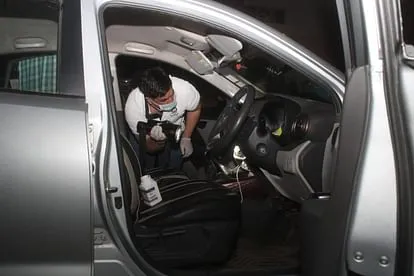Newborn Theft in Hospitals: Supreme Court Orders License Cancellation – A Wake-Up Call for India’s Medical System
In a chilling yet eye-opening judgment that has shaken both the medical and legal communities, the Indian judiciary has taken a firm stance on one of the most heart-wrenching crimes imaginable—the theft of newborns from hospitals. The Court ruled that in the event of such an incident, the first and immediate step should be the cancellation of the hospital’s license, holding medical institutions directly accountable for any negligence leading to such a tragedy.
This ruling comes in response to a horrifying incident where a newborn baby was abducted from a hospital and given to a couple who expressed a desire for a male child. This case has not only sparked national outrage but also brought to light the glaring loopholes in hospital security systems, as well as the deep-rooted societal preference for male children in India.
Let’s delve into the full story, the court’s reasoning, the wider implications for the medical industry, and how this ruling might finally catalyze a change in both legal frameworks and societal mindset.

The Case That Shook the Nation
In a government-run hospital in India, what should have been a joyous moment for a family turned into a nightmare. A mother delivered a healthy baby, only to discover that her child had mysteriously gone missing shortly after birth. Panic spread like wildfire, and an immediate police investigation ensued.
Within days, the newborn was traced to a couple who had illegally acquired the child through a network of intermediaries, driven by their desperation to have a male heir. Shockingly, preliminary findings revealed that the hospital had no CCTV surveillance in the maternity ward, lacked basic security measures, and had no proper verification process for individuals entering or leaving the neonatal section.
Even worse, there were no digital records or biometric tracking to identify newborns and ensure they are safely returned to their biological parents.
A Strong Legal Precedent: License Cancellation for Negligent Hospitals
In response to this case, the Court made a landmark ruling. The bench stated unequivocally:
“When a child is stolen from the custody of a hospital, it reflects absolute administrative failure. The institution must be held liable, and its license must be canceled with immediate effect.”
The judiciary’s focus was clear—accountability must start at the top, and hospitals, whether private or public, must bear the consequences of endangering lives through carelessness and weak systems.
This ruling introduces a powerful legal precedent, empowering state and health authorities to take swift action without waiting for prolonged investigations or bureaucratic red tape.
Newborn Theft in Hospitals: A National Concern
Sadly, newborn theft in hospitals is not an isolated phenomenon in India. Over the past decade, multiple reports have emerged, particularly from overburdened government hospitals and under-regulated private clinics, where newborns have either gone missing or were abducted and sold to childless couples.
Some common patterns identified include:
- Lack of surveillance systems (CCTV cameras not functioning or absent altogether)
- Understaffed maternity wards
- No ID verification or pass system for visitors
- Baby swapping or abductions during busy visiting hours
- Collusion of hospital staff with child traffickers or intermediaries
These loopholes have created a dangerous breeding ground for baby trafficking, often disguised under the veil of “helping” infertile couples.
The Dark Reality: Gender Bias and Societal Pressure
What makes this case even more disturbing is the gender bias at its core. The couple who received the stolen child allegedly did so because they specifically wanted a male child.
This reflects a disturbing societal trend in parts of India, where male children are still seen as more “valuable” due to:
- The perception that boys carry the family name
- Cultural preference rooted in patriarchy
- Economic benefits (future earners and caretakers)
- Dowry fears associated with raising daughters
Despite several government campaigns like “Beti Bachao, Beti Padhao”, the male-child obsession continues to fuel gender-based crimes, including female foeticide, gender-selective abortions, and now, horrifyingly, newborn thefts for illegal adoption.
Legal and Administrative Implications of the Ruling
With the Court’s ruling, there is now a clear legal directive that places the burden of newborn safety squarely on the hospital administration.
The following actions are likely to be implemented going forward:
1. Mandatory Surveillance Protocols
All hospitals, especially those handling childbirths, will be expected to install functioning CCTV systems with continuous monitoring.
2. Digital Tracking of Newborns
Biometric tagging, barcoded ID bands, and electronic record-keeping will become essential for tracking and identifying babies.
3. Restricted Entry and Exit Zones
Maternity and neonatal wards will require secure access, with visitor verification, digital logs, and possibly facial recognition in high-risk zones.
4. Regular Security Audits
Health departments may initiate quarterly security audits of all maternity hospitals to ensure compliance.
5. Criminal Liability for Negligent Staff
Doctors, nurses, or administrative staff found complicit—or grossly negligent—could face criminal charges, in addition to civil penalties.
6. Blacklist and Deregistration
Hospitals found guilty in such cases may be blacklisted and de-registered from medical accreditation boards.
Role of Healthcare Providers: A Moral and Legal Duty
Beyond legal implications, this judgment serves as a moral warning to healthcare institutions. The primary role of hospitals is to provide safe and ethical care. That includes:
- Ensuring new mothers can trust the system
- Protecting the lives and identities of infants
- Creating a safe environment where such crimes are impossible, not just unlikely
Medical professionals must understand that negligence is not merely a clerical error—it can result in lifelong trauma for families and irreparable damage to a child’s future.
Voices from the Ground: What Experts Say
Dr. Ranjana Kumari, Director of the Centre for Social Research, stated:
“This ruling is a long time coming. It sends a strong message to hospitals and also highlights how our obsession with sons continues to haunt us in violent, unthinkable ways.”
Legal expert Adv. Shyam Mehta remarked:
“By calling for license cancellation, the Court has set a benchmark. No hospital can now afford to ignore safety protocols. This is the kind of judicial activism India needs more of.”
Can Technology Help Prevent Newborn Theft?
Absolutely. With smart hospital infrastructure, several solutions can be deployed to prevent such incidents:
- RFID wristbands for babies and mothers, ensuring real-time tracking
- Geo-fencing alerts if a baby is taken outside a predefined area
- Automated visitor management systems
- Digital logs and facial recognition for anyone accessing maternity sections
- AI-driven surveillance to flag suspicious activity
Investing in these systems may seem costly at first, but they ultimately save lives and foster trust over time.
Public Reactions and Social Media Outcry
News of the Court’s directive quickly went viral on social media, with thousands expressing anger and concern. Hashtags like #StolenBabyJustice, #HospitalNegligence, and #CancelLicenseNow began trending across platforms.
Many users shared their own frightening experiences of lax hospital security. Others demanded that public hospitals receive urgent reforms, including better funding, trained staff, and accountability systems.
Celebrities and public figures also weighed in, calling it a national shame that newborns could be abducted so easily in a supposed modern healthcare setup.
Conclusion: A Step Toward Justice, But More Work Ahead
The Supreme Court’s direction to cancel hospital licenses in the event of newborn theft is more than just a legal order—it’s a societal wake-up call. It forces us to ask: What kind of society allows babies to be stolen and sold? Why do we still value boys over girls? And why do we continue to ignore hospital accountability until it’s too late?
This ruling, while powerful, must be backed by action—from health ministries, hospital boards, law enforcement, and most importantly, from us as a society. Protecting newborns is not a privilege—it is a basic human right.
Let this be the beginning of a safer, more humane healthcare system where every child is safe, every mother is respected, and every institution is held accountable.
If you found this article insightful, please share it to raise awareness. Let’s make newborn safety a national priority. Follow BuzzTimes for more












Thank you for your sharing. I am worried that I lack creative ideas. It is your article that makes me full of hope. Thank you. But, I have a question, can you help me?